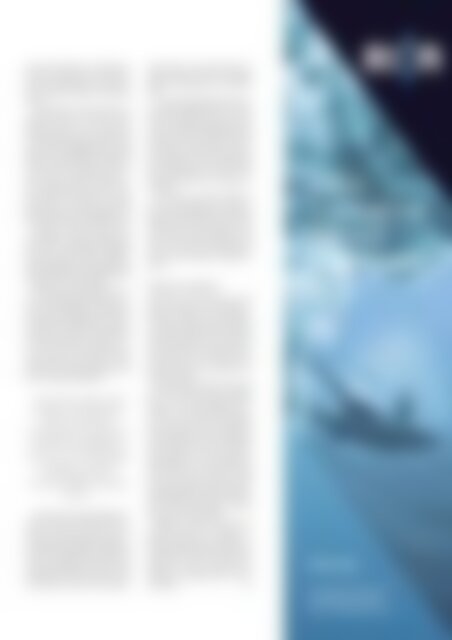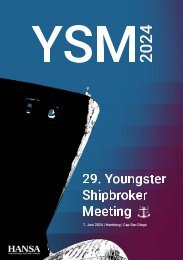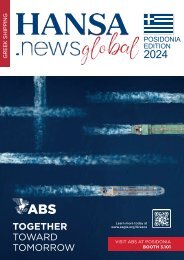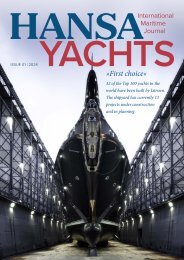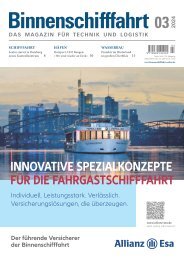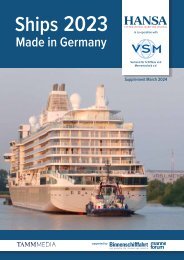HANSA 05-2019
Nor-Shipping ’19 | Maritime Hub Norway | Finanzplatz Oslo | Tugs & Salvage | HullPIC | Offshore-Logistik | NordLB | Breakbulk Europe | Hansa Heavy Lift | HS Schiffahrt | MPP-Carrier
Nor-Shipping ’19 | Maritime Hub Norway | Finanzplatz Oslo | Tugs & Salvage | HullPIC | Offshore-Logistik | NordLB | Breakbulk Europe | Hansa Heavy Lift | HS Schiffahrt | MPP-Carrier
You also want an ePaper? Increase the reach of your titles
YUMPU automatically turns print PDFs into web optimized ePapers that Google loves.
Schiffstechnik | Ship Technology<br />
back in 2015, before coordinating a<br />
number of flag states in a joint paper<br />
on vessel autonomy for the June<br />
2017 Maritime Safety Committee<br />
(MSC).<br />
»Getting the international regulations<br />
in place is crucial for the<br />
business case, so we are very much<br />
following the process at IMO and<br />
also participating through the flag<br />
states. We are delighted to see that<br />
IMO has taken steps to tackle this<br />
matter as fast as possible and we expect<br />
to hear output from the current<br />
scoping exercise at MSC 101.<br />
From One Sea’s perspective, we feel<br />
that there is a need to keep IMO<br />
fully informed on technologies and<br />
advances in a fast-changing sector.«<br />
Crafting maritime rules while<br />
technology is still developing fast<br />
has proved a challenge for shipping<br />
in the recent past, which is why Haikkola<br />
emphasises time and again the<br />
need to keep channels open between<br />
regulators and technologists.<br />
»I have been impressed by the efforts<br />
of the flag states and class societies<br />
in developing their thinking on<br />
autonomous shipping, but it’s also<br />
true that the impetus for change is<br />
coming from actual pilot projects<br />
involving suppliers and ship owners,«<br />
she says. »Autonomous shipping<br />
demands new skill sets from<br />
everyone, including regulators and<br />
those working in approval.«<br />
»I have been impressed by<br />
the efforts of the flag states<br />
and class societies in<br />
developing their thinking on<br />
autonomous shipping, but<br />
it’s also true that the impetus<br />
for change is coming from<br />
actual pilot projects<br />
involving suppliers and ship<br />
owners.«<br />
Drawing on its unparalleled experience<br />
to date, One Sea seeks to facilitate<br />
an industry alliance to drive<br />
autonomous shipping through international<br />
cooperation, rather than<br />
create a talking shop hampered by<br />
competing agendas and commercial<br />
sensitivities. »The ecosystem is open<br />
to all industry partners, and organizations<br />
from across the marine domain<br />
will play vital roles and bring<br />
different competencies,« says Haikkola.<br />
A recent World Maritime University<br />
study suggested that, by 2040,<br />
autonomous ships will account for<br />
11–17% of global shipping but that<br />
traffic growth over the period would<br />
actually create more jobs for seafarers.<br />
However, WMU said roles at sea<br />
would change, with crews taking a<br />
more supporting role while some<br />
tasks done today at sea would transfer<br />
ashore.<br />
One Sea has recently initiated a<br />
new research program covering remote<br />
vessel piloting at sea. Finnish<br />
legislators are set to bring into force<br />
a framework during <strong>2019</strong> that will<br />
allow remote vessel navigation and<br />
control to take place within designated<br />
sea areas subject to public license.<br />
Improved conditions<br />
»We believe that autonomous shipping<br />
will improve the working conditions<br />
of seafarers,« says Haikkola.<br />
»Some of the work done will be<br />
moved from ship to shore and there<br />
will probably also be more possibilities<br />
to specialise in specific areas on<br />
the ship; and, as in all other areas<br />
today, there will be a need for improved<br />
IT skills.«<br />
At this stage, it is hard to say what<br />
the future will look like, Haikkola<br />
says, at a time when different technologies<br />
are being applied. However,<br />
she adds: »There are definitely<br />
some sectors that are more likely to<br />
be early adapters, but it all depends<br />
on the business cases. Short sea shipping,<br />
supply vessels and road ferry<br />
type applications are most likely, but<br />
we have also seen an interest in ship<br />
types such as tugs. Passenger vessels<br />
in general (apart from the road ferries)<br />
are likely to be only interested in<br />
parts of these technologies – such as<br />
situational awareness aids.«<br />
Things are already moving sufficiently<br />
quickly to anticipate orders<br />
for autonomous or remote controlled<br />
vessels from One Sea partner<br />
companies as the »next step«, Haikkola<br />
says. »These could be either<br />
retrofits to existing vessels or newbuildings.«<br />
ED<br />
<strong>HANSA</strong> International Maritime Journal <strong>05</strong> | <strong>2019</strong> NorShipping<br />
RINA.<br />
Excellence<br />
Behind<br />
Excellence.<br />
rina.org<br />
Come and visit us at<br />
Norshipping <strong>2019</strong><br />
HALL D Booth D<strong>05</strong>-2<br />
19


